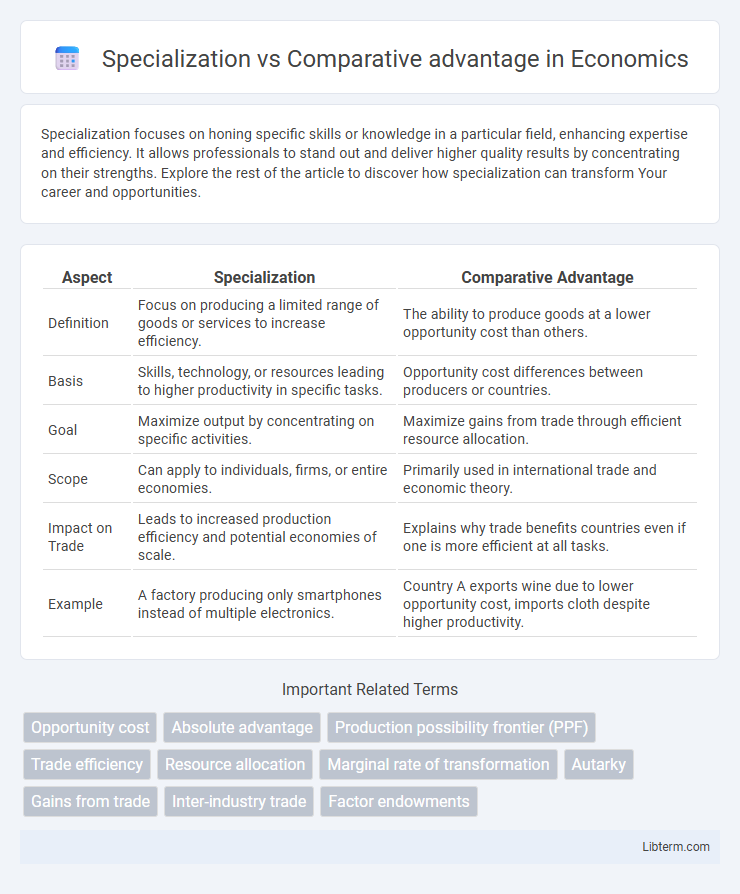Specialization focuses on honing specific skills or knowledge in a particular field, enhancing expertise and efficiency. It allows professionals to stand out and deliver higher quality results by concentrating on their strengths. Explore the rest of the article to discover how specialization can transform Your career and opportunities.
Table of Comparison
| Aspect | Specialization | Comparative Advantage |
|---|---|---|
| Definition | Focus on producing a limited range of goods or services to increase efficiency. | The ability to produce goods at a lower opportunity cost than others. |
| Basis | Skills, technology, or resources leading to higher productivity in specific tasks. | Opportunity cost differences between producers or countries. |
| Goal | Maximize output by concentrating on specific activities. | Maximize gains from trade through efficient resource allocation. |
| Scope | Can apply to individuals, firms, or entire economies. | Primarily used in international trade and economic theory. |
| Impact on Trade | Leads to increased production efficiency and potential economies of scale. | Explains why trade benefits countries even if one is more efficient at all tasks. |
| Example | A factory producing only smartphones instead of multiple electronics. | Country A exports wine due to lower opportunity cost, imports cloth despite higher productivity. |
Understanding Specialization in Economics
Specialization in economics refers to the process where individuals, firms, or countries concentrate on producing goods or services they can create most efficiently, enhancing productivity and economic output. This concept differs from comparative advantage, which emphasizes producing goods with the lowest opportunity cost rather than absolute efficiency. Understanding specialization helps explain the benefits of trade and how economies allocate resources to optimize production based on skills, technology, and resource availability.
Defining Comparative Advantage
Comparative advantage refers to the ability of an individual, firm, or country to produce a good or service at a lower opportunity cost than others, which drives efficient resource allocation in trade. Specialization involves focusing on producing goods or services where one has a comparative advantage, maximizing productivity and economic gains. Understanding comparative advantage enables entities to benefit from trade by concentrating on activities with the greatest relative efficiency.
Key Differences: Specialization vs Comparative Advantage
Specialization refers to the process where individuals, firms, or countries focus on producing a limited range of goods or services to increase efficiency, while comparative advantage highlights the ability to produce a good at a lower opportunity cost compared to others. The key difference lies in specialization emphasizing production concentration and efficiency, whereas comparative advantage is grounded in opportunity cost and relative productivity differences. Understanding comparative advantage enables optimal trade decisions, maximizing overall economic welfare beyond mere specialization benefits.
The Role of Opportunity Cost
Specialization is driven by reducing opportunity costs, allowing individuals or countries to focus on producing goods or services for which they have the lowest opportunity cost. Comparative advantage emphasizes this by highlighting that even if one party is less efficient overall, they benefit by specializing in tasks with relatively lower opportunity costs. Understanding opportunity cost is crucial for optimizing resource allocation and maximizing global production efficiency.
Benefits of Specialization in Global Trade
Specialization enhances productivity by allowing countries to focus on producing goods where they have expert skills and resource efficiency, leading to increased global output. It reduces production costs, enabling nations to export surplus products and import items they produce less efficiently, fostering mutually beneficial trade relationships. This focus on specialized industries promotes innovation, economies of scale, and stronger competitive advantages in international markets.
How Comparative Advantage Drives International Trade
Comparative advantage drives international trade by enabling countries to specialize in producing goods and services at a lower opportunity cost than their trading partners, increasing overall efficiency and economic gains. This principle explains how nations benefit from trade even if one country holds an absolute advantage in producing all goods, fostering mutually beneficial exchanges based on relative productivity differences. By allocating resources toward industries with comparative advantages, countries enhance global production, optimize resource distribution, and stimulate economic growth through expanded markets and competitive pricing.
Real-World Examples of Comparative Advantage
Countries like China specialize in manufacturing electronics due to abundant low-cost labor, showcasing comparative advantage by producing goods more efficiently than others. Brazil's vast arable land enables it to dominate coffee production, exporting at lower opportunity costs compared to other countries. These real-world examples highlight how nations maximize economic gains by focusing on industries where they hold comparative advantages rather than absolute specialization.
Limitations and Risks of Specialization
Specialization can lead to economic vulnerabilities by increasing dependence on specific industries or resources, making economies more susceptible to market fluctuations and supply chain disruptions. Over-specialization may also result in loss of skills diversity, reducing adaptability to technological changes or shifts in global demand. Comparative advantage, while promoting efficiency, requires balance to mitigate risks associated with over-reliance on narrow sectors.
Strategies for Maximizing Economic Efficiency
Specialization leverages a producer's expertise in specific tasks to increase overall productivity, while comparative advantage focuses on producing goods at a lower opportunity cost relative to others. Strategies for maximizing economic efficiency involve allocating resources to sectors or tasks where entities hold the greatest comparative advantage, minimizing trade-offs and fostering mutually beneficial trade relationships. By combining specialization with comparative advantage, economies can optimize output, reduce costs, and enhance competitiveness in global markets.
Specialization and Comparative Advantage in the Modern Economy
Specialization in the modern economy enables firms and countries to focus resources on producing goods or services where they have the highest efficiency, leveraging advanced technology and skilled labor. Comparative advantage emphasizes producing at lower opportunity costs, fostering global trade by allowing economies to benefit from their relative efficiencies despite differing absolute productivity levels. Together, specialization and comparative advantage drive innovation, increase productivity, and enhance international trade dynamics in contemporary markets.
Specialization Infographic

 libterm.com
libterm.com